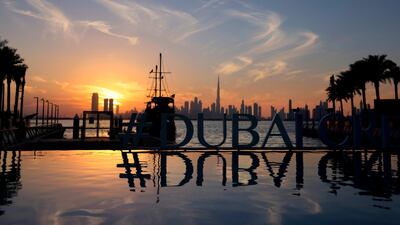In the days before the air corridor opened between the UK and UAE last November, travel agents predicted 20 per cent rises in the price of a Dubai holiday. So pent-up was the mental and physical need for a break from Britain's Covid-19 lockdown.
"We're pleased to see more sunshine on the horizon," read a tweet from British Airways.
As waves of Britons hit the tarmac at Dubai International Airport in the following weeks, it wasn't only the sunshine they sought. One told The National the air corridor restored the possibility of seeing her Dubai-based family again after a year apart. Tens of thousands of Britons living in the Emirates shared similar hopes of reunion.
The reopening of Dubai's border for international tourists last summer was a seminal moment in the Emirates' experience with the Covid-19 pandemic. The more than 80 per cent of UAE residents with loved ones abroad saw it as a lifeline. But it was also a saving grace for business owners, hospitality workers, banks and the wider economy.
And it was hard won. The sacrifices that ensured the confidence to reopen Dubai were innumerable. In the early months of the pandemic, the country enforced one of the strictest lockdowns in the world. Tens of thousands of residents who were abroad when the borders first closed were required to wait weeks – sometimes months – until it was safe to return.
Dubai residents needed permits to leave their homes. Masks were mandatory early on, for some time even in one's own car. Gatherings were banned, including during Ramadan and Eid. Places of worship and schools were closed, along with bars and many restaurants. Penalties of up to Dh10,000 ($2,723) were announced for breaching public health rules. And for the first time in the history of this country's union, a border was enforced between the two largest emirates.
The emotional toll of these measures was high. A country that had become a beacon for cosmopolitanism and a fast lane in the world's path to progress had been forced, almost overnight, to retreat indoors and brace itself. But as difficult as it was, that was what UAE residents did – for the sake of their society, for the sake of one another and for the sake of securing a future that could once again be called "normal".
As they did so, the country built a formidable infrastructure with which to carve a way out of the pandemic that might avoid a return to the most painful restrictions. This included widespread, accessible testing, a coherent set of rules and, now, vaccines.
People in the UAE will be the first to admit how fortunate they are. Other countries – lacking the resources or, sometimes, the competence – have been unable to build this infrastructure for themselves. And so many of their citizens came here for respite and emotional convalescence, and local authorities allowed them to do so because the country could manage it.
The rules were strong enough that those who followed them would be safer. The system was strong enough that those who fell ill could be cared for. A piece of the UAE's true self and the mental health of its residents could be preserved amid the tempest.
Not every visitor in recent months has followed the rules. Photos of social media influencers, maskless on Dubai beaches, have garnished news pieces around the world. The lack of respect from some for the sacrifices that have allowed them to visit has no doubt contributed to the country's recent spike in infections. But even as visitors come and go, the UAE's arms will remain open for as long as they can, because that is the ethic that drives this country forward.
In the past 24 hours, the UAE reported 3,249 new cases and, tragically, 10 deaths. However, it also reported 3,904 recoveries, and health workers administered 157,783 vaccine doses.
A step back, but two steps forward – never losing sight of what matters along the way.














